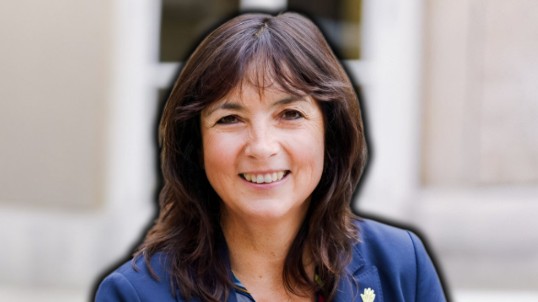Olivia Chapple: The Inspirational Force Behind Horatio’s Garden

In the world of healthcare and philanthropy, few names resonate with such compassion and impact as Olivia Chapple. A former general practitioner, bereaved mother, and tireless advocate for healing environments, Chapple has dedicated her life to transforming the experience of spinal injury patients across the UK. As the founder and Chair of Trustees of Horatio’s Garden, her innovative approach has redefined how we perceive the connection between nature and recovery. Recognised with multiple national honours, including an OBE and the Royal Horticultural Society’s Elizabeth Medal of Honour, Chapple’s journey is one of resilience, empathy, and visionary leadership.
The Tragedy That Sparked a Movement
The story of Horatio’s Garden is intimately linked to Olivia Chapple’s personal tragedy. In 2011, her eldest son, Horatio, lost his life in a polar bear attack while on a school expedition in Svalbard, Norway. Horatio, just 17 at the time, had shown remarkable emotional intelligence and curiosity. He had volunteered at the Duke of Cornwall Spinal Treatment Centre in Salisbury and was working on a research project about patients’ psychological needs.
Moved by her son’s commitment to helping others, Chapple decided to honour his legacy by realising the vision he had conceived: a garden sanctuary within the hospital where patients could connect with nature as part of their recovery. What began as a tribute to a lost son has since grown into a nationwide charity touching the lives of thousands.
Founding Horatio’s Garden
In 2012, Olivia Chapple, alongside her husband David, established Horatio’s Garden. The first garden was built at Salisbury, designed by acclaimed garden designer Cleve West. This project set the standard for what was to come—an expertly designed, fully accessible garden space tailored to the needs of patients with spinal cord injuries.
Under Chapple’s stewardship, the charity has expanded to cover multiple NHS spinal injury centres, with gardens now flourishing in locations such as Glasgow, Stoke Mandeville, London, and Cardiff. Each project involves collaboration with renowned garden designers, NHS staff, and volunteers, all contributing to a therapeutic space that facilitates both physical rehabilitation and emotional wellbeing.
The Healing Power of Nature
Olivia Chapple has long advocated for the essential role that green spaces play in the healing process. Her belief is supported by numerous studies highlighting how access to nature can reduce stress, improve mental health, and even accelerate recovery times. Patients in spinal units often spend months in rehabilitation, isolated and disconnected from the outside world. Horatio’s Gardens bridge that gap, offering tranquillity and a sense of normalcy.
These gardens are not just visually pleasing. They are meticulously designed to be wheelchair-accessible, with thoughtful details such as raised flower beds, smooth pathways, and sheltered seating areas. They also serve as venues for horticultural therapy sessions, art workshops, family visits, and quiet reflection. Chapple’s understanding of the emotional and psychological needs of patients is evident in every element.
Recognition and Awards
Chapple’s contributions have not gone unnoticed. In 2024, she was awarded an OBE (Officer of the Order of the British Empire) in the King’s Birthday Honours for her services to people with spinal injuries. The same year, she received the Royal Horticultural Society’s Elizabeth Medal of Honour, a prestigious accolade that recognises individuals outside the horticultural profession who have made a significant impact on the nation’s wellbeing through gardening.
Earlier in the year, Chapple was appointed as the High Sheriff of Wiltshire, a role steeped in history and royal patronage. She used her tenure to further promote the importance of gardens in public health and community resilience.
Challenges and Triumphs
Despite its current success, the journey of Horatio’s Garden has not been without challenges. Fundraising to build and maintain these gardens requires constant effort, especially as each new site demands substantial investment. However, Chapple’s transparency, commitment, and ability to galvanise support have enabled the charity to thrive.
She has built a team of trustees, volunteers, and ambassadors who share her passion and uphold the highest standards of design and care. Her background in medicine has given her the insight needed to bridge clinical and emotional support, making her uniquely qualified to lead such an initiative.
Beyond the Hospital Walls
Olivia Chapple’s influence goes far beyond the garden gates. Through her work, she has contributed to a growing awareness of how healthcare environments should be more than sterile institutions. She has inspired hospital administrators, healthcare professionals, and designers to reimagine patient spaces, incorporating biophilic principles and community engagement.
Her work has also encouraged dialogue about bereavement, grief, and how personal loss can be channelled into meaningful action. By speaking publicly about Horatio’s death and the charity’s origins, she offers a powerful narrative of hope and purpose.
The Future of Horatio’s Garden
With seven gardens already open and an eighth underway in Sheffield, the future looks promising. Each new project brings unique challenges, from landscape constraints to local climate and hospital logistics. However, Chapple and her team continue to adapt, ensuring that the core values of dignity, beauty, and accessibility remain central.
Plans are also in motion to expand the reach of Horatio’s Garden beyond spinal centres, potentially into other long-term care facilities. Educational programmes, research partnerships, and broader community outreach are also on the horizon, cementing the charity’s place as a leader in holistic patient care.
Personal Life and Philosophy
Despite her public role, Olivia Chapple remains grounded. She lives in Wiltshire with her family and continues to work closely with hospital staff, patients, and designers. Her philosophy is one of active compassion—that meaningful change begins when we listen to those in need and act with both heart and head.
Her medical training informs her pragmatic approach, but it is her lived experience that shapes her deeper mission. She understands that recovery is not just physical; it is emotional, social, and spiritual. By integrating these elements into every garden, she offers a template for healing that is as beautiful as it is effective.
Conclusion
Olivia Chapple has turned profound loss into a legacy that continues to bloom across the UK. Through Horatio’s Garden, she has not only honoured her son’s memory but also elevated the standard of care for spinal injury patients. Her work stands as a testament to what can be achieved when love, vision, and action come together.
In a world where healthcare systems are often stretched and impersonal, Chapple’s gardens remind us of the human spirit’s resilience and the nurturing power of nature. Her journey from grief to growth is not only inspiring but a blueprint for how individuals can make a lasting impact on countless lives. As Horatio’s Garden continues to grow, so too does the influence of a woman who dared to plant seeds of hope in the most unlikely places.



